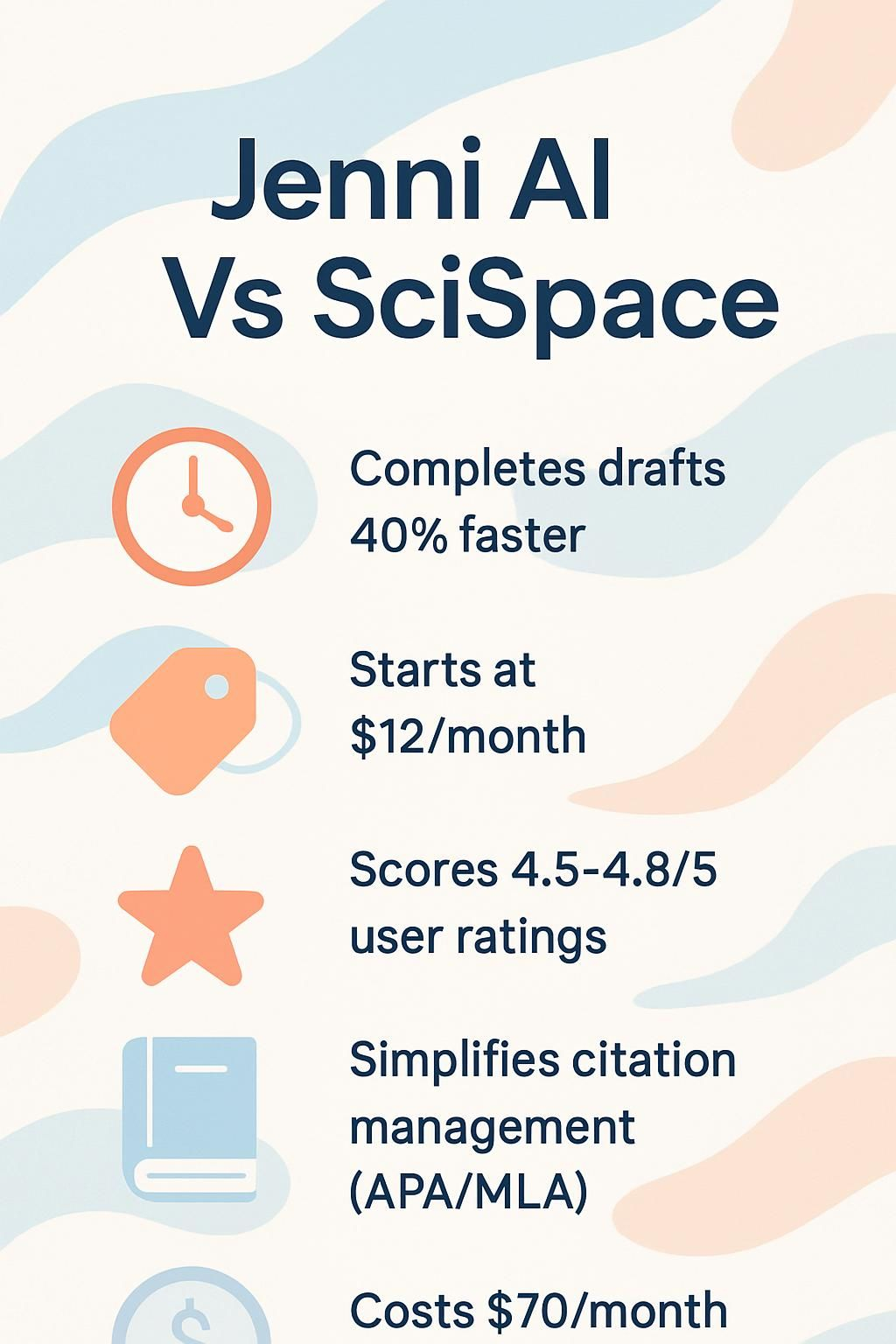Struggling to find the best AI tool for writing or research? Jenni AI and SciSpace are two popular options with powerful features. This blog will break down their strengths, compare them side by side, and help you pick the right one.
Keep reading to make your decision easier!
Key Takeaways
- Jenni AI helps writers complete drafts 40% faster. It assists with creative tasks, academic writing, and works seamlessly with tools like Google Docs and Word. Its budget-friendly plan starts at $12/month.
- SciSpace is excellent for thorough academic research. Features include semantic search, literature reviews, and a “Chat with PDF” tool. This simplifies detailed research tasks but costs $70/month for advanced plans.
- Jenni AI provides real-time suggestions, outlines, and straightforward citation management (APA/MLA). SciSpace is effective in organizing multiple PDFs for analysis and managing scholarly citations accurately.
- User ratings show Jenni AI scores higher (4.5–4.8/5) than SciSpace (3.5/5). Beginners find Jenni easier to use due to its simple interface designed for general content creation.
- Choose Jenni AI for creative or casual writing needs; select SciSpace if focused on intensive academic work like analyzing papers or conducting literature reviews.

Key Features of Jenni AI
Jenni AI acts like a writing buddy, helping you craft better pieces with ease. It streamlines your process by offering smart tools to make academic work less of a headache.
How does Jenni AI assist with writing?
Jenni AI helps writers finish drafts 40% faster. It quickly generates sentences and paragraphs, saving time on academic writing or creative tasks. Struggling with writer’s block? This tool sparks ideas instantly.
Users also get easy access to outline creation to organize thoughts.
“Writing should flow like a conversation; Jenni AI makes that possible.”
What real-time suggestions and autocomplete does Jenni AI offer?
Jenni AI offers real-time support to improve your writing speed. It completes sentences and paragraphs based on what you type, saving time and effort. Its autocomplete adapts to match your tone and style, making suggestions feel natural.
This tool integrates with Microsoft Word, Google Docs, and web browsers seamlessly. The interface is simple yet effective for academic writing or creative tasks. While helpful, some outputs may repeat ideas or lack precision in long-form work.
Despite that, users report faster results—up to 40% quicker than manual typing alone.
How can I upload PDFs and manage citations in Jenni AI?
Uploading PDFs is simple. Use the upload feature to add your research papers or reference materials directly into Jenni AI. The tool seamlessly integrates these sources, letting you pull information while writing.
Citations are easy to handle too. Jenni AI supports formats like APA, MLA, Harvard, and IEEE. It automatically generates citations based on your uploaded files. You can organize references and manage them throughout your academic projects without breaking a sweat.
Key Features of SciSpace
SciSpace simplifies research tasks with smart tools. It helps explore and understand papers faster than ever.
What advanced literature review features does SciSpace provide?
SciSpace auto-structures and summarizes literature from multiple PDFs into neat tables. This saves time for Ph.D. students and researchers handling loads of academic papers. It compares findings across sources, making it easier to spot trends or gaps in research.
The platform simplifies citation management for academic formats like APA or MLA. Users can extract key data, even from complex sections of PDFs, for detailed analysis. Semantic search digs deep into databases to find relevant research faster than traditional methods.
How does SciSpace use semantic search and integrate research?
SciSpace uses semantic search to dig deep into millions of research papers. It links related ideas and extracts key information. This helps users find precise results, even with complex queries.
For example, searching for “climate impact on agriculture” brings connected papers across disciplines.
The tool merges data from multiple PDFs intelligently. Scientists can analyze findings without hopping between files. Semantic analysis also breaks down technical terms, making them easy to grasp.
Users can manage citations effortlessly while exporting in Word or LaTeX formats for polished academic work.
How can I chat with PDFs and analyze papers using SciSpace?
SciSpace’s “Chat with PDF” feature makes analyzing research papers easy. Users can ask for section summaries, technical term explanations, or even extract data directly from PDFs. This tool supports deep academic needs and simplifies the research process.
You can also analyze multiple PDFs at once, speeding up literature reviews. The chat interface helps manage citations and check for plagiarism without switching tools. Even lower-tier plans include this handy feature, making it accessible to many users focused on academic workflows or scientific writing.
Comparison of Performance
Jenni AI and SciSpace each shine in their own way, offering distinct strengths that suit different writing needs—pick your favorite by exploring more.
How do Jenni AI and SciSpace compare in writing quality and style?
Jenni AI produces smooth, adaptable text suited for general or creative writing. It often crafts engaging narratives but may overinflate long-form pieces. Its tone feels human-like, making it ideal for casual or dynamic content.
SciSpace leans on precision and structure, excelling in academic tasks like summarizing research papers. Its factual style ensures that outputs meet rigorous academic standards while staying concise and clear.
Which tool is easier to use and has a better user interface?
Jenni AI offers a simple, beginner-friendly layout. Its design feels intuitive, helping users get started quickly. It works smoothly with Microsoft Word and Google Docs, making writing seamless for everyday tasks.
The addition of browser extensions adds more convenience to the workflow.
SciSpace, on the other hand, focuses on academic research tools. Its interface prioritizes advanced features like semantic search and literature review integration. While clean and well-organized, it can seem trickier for new users due to its complex functionalities.
Tools like chat-with-PDF make it powerful but less straightforward compared to Jenni AI’s setup.
How versatile are Jenni AI and SciSpace in different applications?
Switching from ease of use, versatility shows clear differences. Jenni AI adapts well to creative writing, academic drafting, and content creation. It works across multiple platforms and supports diverse formats like blogs or reports.
This flexibility makes it suitable for writers with varied goals.
SciSpace focuses on deep academic work. Its features shine in literature reviews, semantic search, and research integration. While great for scholars analyzing research papers or managing citations, its options outside those tasks are limited.
For example, SciSpace struggles in creating non-academic content compared to Jenni AI’s broader reach. The tools align with distinct needs based on their strengths—general writing versus focused study tasks.
Jenni AI vs. Other AI Tools (Including SciSpace)
Jenni AI shines with its writing help, while tools like SciSpace focus more on research support. Each has standout features suited for different tasks.
How does Jenni AI compare to other AI writing tools like SciSpace?
Jenni AI stands out with its speed. It boosts writing by up to 40%, saving users a ton of time. SciSpace focuses more on deep academic research, but its advanced plan costs $70/month compared to Jenni’s affordable $12/month unlimited plan.
For beginners or casual writers, Jenni offers ease of use and integration with tools like Google Docs and Microsoft Word.
Both tools include plagiarism detection, yet SciSpace provides this in all plans while Jenni reserves it for higher tiers. User ratings favor Jenni, scoring between 4.5–4.8/5 compared to SciSpace’s 3.5/5 rating.
This reflects better user satisfaction and simplicity in handling tasks like citations and proofreading for non-specialized uses.
Final Verdict
Jenni AI shines for creative writing and easy use, while SciSpace stands strong for deep academic research—your choice boils down to what you need most.
What is the overall verdict on Jenni AI versus SciSpace?
Jenni AI shines for general writing tasks and ease of use. It scores higher with users, averaging 4.5 to 4.8 out of 5. Its quick suggestions, real-time autocomplete, and seamless workflow integration save time for writers across all fields.
SciSpace focuses heavily on academic research processes like literature reviews and semantic search. Its deep citation features cater to researchers but come at a higher price point.
For those juggling both creative writing and heavy research, using both tools covers the entire pipeline efficiently. Next up is how Jenni stacks against other AI competitors!
Conclusion
Choosing between these two tools boils down to your goals. Need writing help for creative and general tasks? Go with Jenni AI. Doing deep academic research or analyzing papers? SciSpace has your back.
Both shine in their own way, but the winner depends on what you need most!
For a more in-depth comparison, be sure to check out our detailed analysis on Jenni AI vs. Elicit.
FAQs
1. What is the difference between Jenni AI and SciSpace?
Jenni AI focuses on academic writing, offering tools like a text editor for tasks such as literature reviews and scientific writing. SciSpace emphasizes semantic search to help users find research papers quickly from databases like Semantic Scholar or the internet.
2. Which tool is better for academic research?
It depends on your needs. Jenni AI acts more as an AI-powered writing assistant, helping with drafting and editing. SciSpace excels in aiding the research process by locating relevant sources through its advanced semantic search capabilities.
3. Can these tools maintain academic integrity?
Both tools aim to support ethical use of artificial intelligence in academia. However, users should avoid relying solely on them without proper citation or plagiarism checks to prevent academic misconduct.
4. Are these platforms compatible with GPT-4 technology?
Yes, both platforms utilize artificial intelligence models similar to GPT-4 to enhance their features, such as generating content or analyzing data during the research process.
5. Do they have plagiarism checkers or AI detectors built-in?
Jenni AI includes some features that assist with maintaining originality in writing, but it’s wise to use a separate plagiarism checker for thorough review. SciSpace primarily focuses on finding reliable sources rather than detecting copied content.
6. How do these tools help simplify scientific writing?
Jenni AI helps structure ideas into clear drafts while acting as an efficient ai-assisted text editor for complex topics like academic research papers. On the other hand, SciSpace simplifies access to relevant studies using its database connections and semantic scholar integration.
